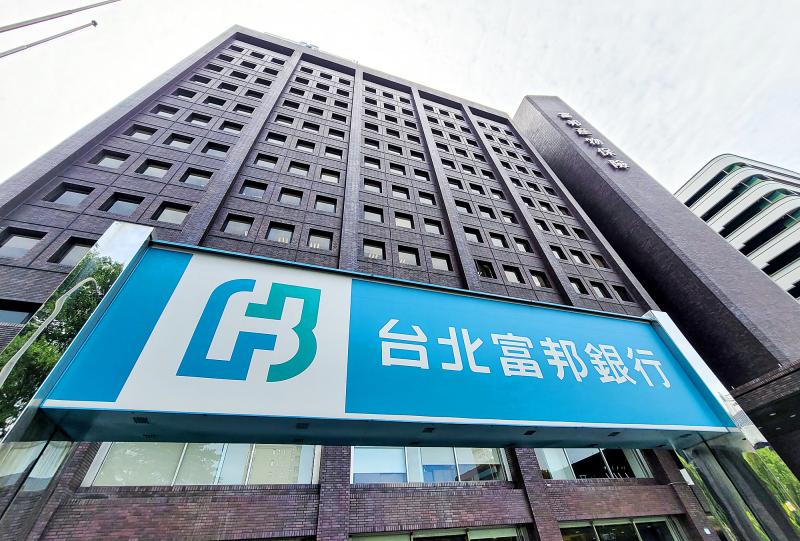Fubon Financial Holding Co (富邦金控) yesterday said that its insurance unit would weather rising COVID-19 insurance claims and no fundraising is needed.
Fubon Insurance Co (富邦產險) said it has sold about 2.31 million COVID-19 insurance policies and as of the middle of this month had paid NT$1.1 billion (US$37.09 million) of claims from 29,000 policyholders.
It pays a total of NT$50 million per day in claims, it said.

Photo: CNA
It is difficult to calculate how much more compensation it would have to pay, as local COVID-19 infections are still on the rise, with a peak not expected until next month, Fubon Insurance said.
Fubon Insurance reiterated that it would not avoid its responsibility to policyholders.
“Fubon Insurance has net value of NT$30 billion to NT$40 billion, and assets of NT$130 billion, not to mention the high net value of Fubon Financial,” Fubon Financial president Jerry Harn (韓蔚廷) told an investors’ conference amid speculation that the company would be unable to bear the burden.
Policyholders would receive compensation, Harn said.
The loss rate on COVID-19 insurance policies was about 15 percent, the company said.
Three factors would affect the figure, including the ultimate number of local infections, the government’s virus policy and clarification of disputes, it said.
If the financial pressure becomes too heavy, Fubon Insurance would consider applying to the Financial Supervisory Commission (FSC) to use part of its special reserve to write off losses, it said.
The insurer can allocate as much as NT$15.5 billion, it said.
Fubon Financial Holding reported an annual decline of 9.4 percent in net profit to NT$46.5 billion for the first quarter, mainly because of a drop of 7 percent in net profit at Fubon Life Insurance Co (富邦人壽) to NT$36.4 billion amid decreasing first-year premiums and lower returns on investments, corporate data showed.
Realized capital gains from fixed-income investments plunged about 75 percent year-on-year to NT$6.7 billion in the first quarter, the data showed.
In related news, China Life Insurance Co (中國人壽) yesterday announced that even though its insurance terms do not stipulate that it must compensate policyholders who catch COVID-19, but are not hospitalized due to the virus, it would pay those who stay home as much as it pays for hospitalizations, as long as they are prescribed drugs.
The drugs are not limited to oral antivirus drugs such as Paxlovid and molnupiravir, or a traditional Chinese compound called Taiwan Chingguan Yihau (清冠一號), or NRICM101, but policyholders should provide prescriptions, a doctor’s diagnosis and a digital COVID-19 certificate with their claims, China Life said.
The FSC has said that insurance firms can decide themselves — while adhering to the terms of their policies — whether to compensate people who catch COVID-19, but are not hospitalized.

Taiwan’s long-term economic competitiveness will hinge not only on national champions like Taiwan Semiconductor Manufacturing Co. (TSMC, 台積電) but also on the widespread adoption of artificial intelligence (AI) and other emerging technologies, a US-based scholar has said. At a lecture in Taipei on Tuesday, Jeffrey Ding, assistant professor of political science at the George Washington University and author of "Technology and the Rise of Great Powers," argued that historical experience shows that general-purpose technologies (GPTs) — such as electricity, computers and now AI — shape long-term economic advantages through their diffusion across the broader economy. "What really matters is not who pioneers

In a high-security Shenzhen laboratory, Chinese scientists have built what Washington has spent years trying to prevent: a prototype of a machine capable of producing the cutting-edge semiconductor chips that power artificial intelligence (AI), smartphones and weapons central to Western military dominance, Reuters has learned. Completed early this year and undergoing testing, the prototype fills nearly an entire factory floor. It was built by a team of former engineers from Dutch semiconductor giant ASML who reverse-engineered the company’s extreme ultraviolet lithography (EUV) machines, according to two people with knowledge of the project. EUV machines sit at the heart of a technological Cold

TAIWAN VALUE CHAIN: Foxtron is to fully own Luxgen following the transaction and it plans to launch a new electric model, the Foxtron Bria, in Taiwan next year Yulon Motor Co (裕隆汽車) yesterday said that its board of directors approved the disposal of its electric vehicle (EV) unit, Luxgen Motor Co (納智捷汽車), to Foxtron Vehicle Technologies Co (鴻華先進) for NT$787.6 million (US$24.98 million). Foxtron, a half-half joint venture between Yulon affiliate Hua-Chuang Automobile Information Technical Center Co (華創車電) and Hon Hai Precision Industry Co (鴻海精密), expects to wrap up the deal in the first quarter of next year. Foxtron would fully own Luxgen following the transaction, including five car distributing companies, outlets and all employees. The deal is subject to the approval of the Fair Trade Commission, Foxtron said. “Foxtron will be

INFLATION CONSIDERATION: The BOJ governor said that it would ‘keep making appropriate decisions’ and would adjust depending on the economy and prices The Bank of Japan (BOJ) yesterday raised its benchmark interest rate to the highest in 30 years and said more increases are in the pipeline if conditions allow, in a sign of growing conviction that it can attain the stable inflation target it has pursued for more than a decade. Bank of Japan Governor Kazuo Ueda’s policy board increased the rate by 0.2 percentage points to 0.75 percent, in a unanimous decision, the bank said in a statement. The central bank cited the rising likelihood of its economic outlook being realized. The rate change was expected by all 50 economists surveyed by Bloomberg. The